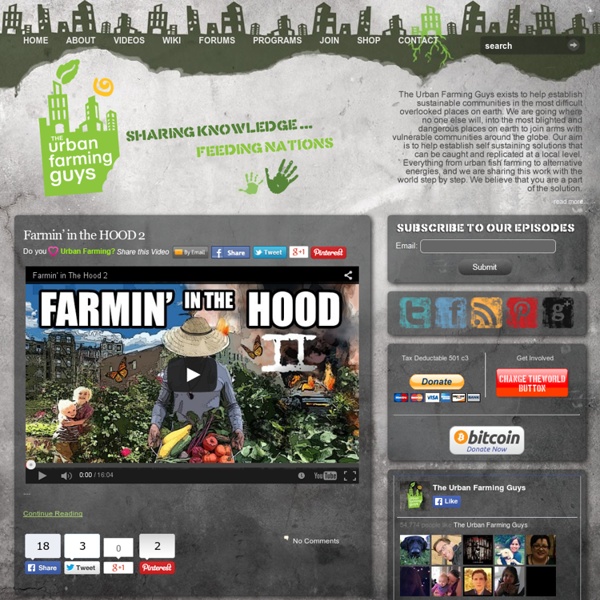



http://theurbanfarmingguys.com/
Related: Permaculture practices & permutationshugelkultur, nature's raised garden beds FOR 25 YEARS I have grown my vegetables in raised beds, but the kind that you need to purchase lumber and bolts and use a saw and hammer to construct, then fill entirely with soil and compost. Lately I’ve been looking longingly at photos of a centuries-old, sustainable way of making raised garden beds called hugelkultur, or hill culture. “It’s like sheet mulching or lasagna gardening,” says Dave Whitinger of All Things Plants, who regularly lectures on the subject, but in hugelkultur, “wood is the first level of your sheet-mulched bed.” In print or my latest public-radio show and podcast, hugelkultur 101 with Dave (whose robust hugelkultur onion bed that is up top). prefer the podcast?
Green Home Business Opportunities: How To Start a Permaculture Design Business Permaculture is an approach to the design and maintenance of landscapes and communities that seeks to mimic the relationships found in natural ecosystems. The permaculture system was developed in the 1970′s by Bill Mollison and David Holmgren, though elements of permaculture design have been used by different cultures around the world for thousands of years. Permaculture has always placed a strong emphasis on sustainability and environmental responsibility. The permaculture method has been used successfully around the world to restore degraded agricultural lands and ecosystems in ways that benefit humans, wildlife, and the environment. For example, in the following video Geoff Lawton, a protege of Bill Mollison and founder of the Permaculture Research Institute, demonstrates his conviction that “you can fix all the world’s problems in a garden” by turning a desolate plot of land in Jordan into a productive and self-sustaining “food forest”: Main Image Credit: sterlic
How to make a tool set Life without tools is barbaric. But even simple tools can be expensive in rural parts of developing countries. Import duties bump the costs up higher than they are in the States or elsewhere, and sometimes only low-quality brands are available anyway. So, to hold off future barbarians, we'd like to show how to build a simple tool set on a very low budget. The Garden Ecology Project Welcome to the Garden Ecology Project (GEP) website! The GEP is a community-research partnership based in New York City. Our goals are: To document the roles of community gardens in providing healthy food, green space, and environmental education, in order to build support for community gardening in urban policy and planning.To develop environmentally friendly vegetable gardening practices like cover cropping, with and for urban gardeners.To enhance educational programs in urban gardening by incorporating collaborative, discovery-based learning methods that increases gardeners’ understanding of ecology. Whether you are a gardener, researcher, or concerned citizen, we invite you to browse this website and consider getting involved in urban agriculture and food justice movements in your community! Blog: The latest in Garden Ecology Project workshops, seasonal gardening tips, and project results.
hugelkultur: the ultimate raised garden beds raised garden bed hugelkultur after one month raised garden bed hugelkultur after one year raised garden bed hugelkultur after two years raised garden bed hugelkultur after twenty years It's a german word and some people can say it all german-ish. Clever Tunnel System Makes Chickens Do The Gardening (Video) Image credit: Ecofilms Australia We've already seen how one farmer trains her chickens to eat slugs, and the internet is full of examples of chicken tractors—portable coops that can be moved to allow hens to till, fertilize, and weed a plot while providing pest control in the process. (see also this overview of chicken tractors at Planet Green.)
Survival Gardening Survival gardening can provide fresh food for you and your family in the aftermath of a disaster. Disasters can occur at anytime and anywhere, and take many forms. Not all disasters are dramatic and natural. For some people a severe economic downturn can be a disaster. Having garden seeds on hand before a disaster strikes is like having homeowners or rental insurance. You hope you will never need it but should the need arise you will be thankful that you have it. New Online Course: Profitable Urban Farming Learning how to establish a profitable urban farm takes a LOT of planning and thinking – it’s certainly not just about land access and good seedlings. So we’re very happy that Curtis Stone, author of The Urban Farmer, has launched this excellent online course. Some of you may have seen + learned from Curtis when we brought him out to Oz in Feburary with Jean-Martin Fortier for our Urban Farming Masterclasses – and some of you may have already read his book The Urban Farmer, which is in the same spirit as this course – down to earth, practical, step-by-step urban farming how to.
Sepp Holzer's Permaculture While most people think they are mending the world's problems by contemplating light bulbs or buying "organic", there are thousands of people making a more significant difference. And out of those thousands there are a few dozen trail blazers. And out of those few dozen there is one guy that is WAY out ahead of the pack. The mighty, the glorious, the amazing ... Sepp Holzer. Sepp Holzer was doing permaculture before he ever heard the word. Start a 1-Acre, Self-Sufficient Homestead - Modern Homesteading Everyone will have a different approach to keeping a self-sufficient homestead, and it’s unlikely that any two 1-acre farms will follow the same plan or methods or agree completely on how to homestead. Some people like cows; other people are afraid of them. Some people like goats; other people cannot keep them out of the garden.